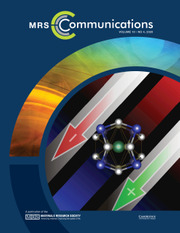Article contents
Equilibrium atomic conformation of Pt2Ru3 nanoparticles under gas atmosphere of CO/H2 investigated by density functional theory and Monte Carlo simulation
Published online by Cambridge University Press: 05 April 2018
Abstract

We have investigated the equilibrium conformation of Pt2Ru3 nanoparticles in the presence of H2 and CO mixture gas using density functional theory (DFT) and Monte Carlo (MC) simulation. A multiple linear regression equation was prepared using DFT results to calculate adsorption energy from the structural descriptors. Using the regression equation, MC simulations were employed to elucidate the equilibrated conformation of Pt2Ru3 particles at a finite temperature of H2/CO where CO concentration in the range 100–500 ppm. MC results indicate that CO/H2 coadsorption induced the rearrangement of alloying atoms and Pt/Ru ratio exposed to the surface decreases with the increase of CO concentration.
Information
- Type
- Research Letters
- Information
- Copyright
- Copyright © Materials Research Society 2018
Footnotes
Present address: Department of Physics, University of Barisal, Kornokathi, Barisal 8200, Bangladesh.
References
- 2
- Cited by


